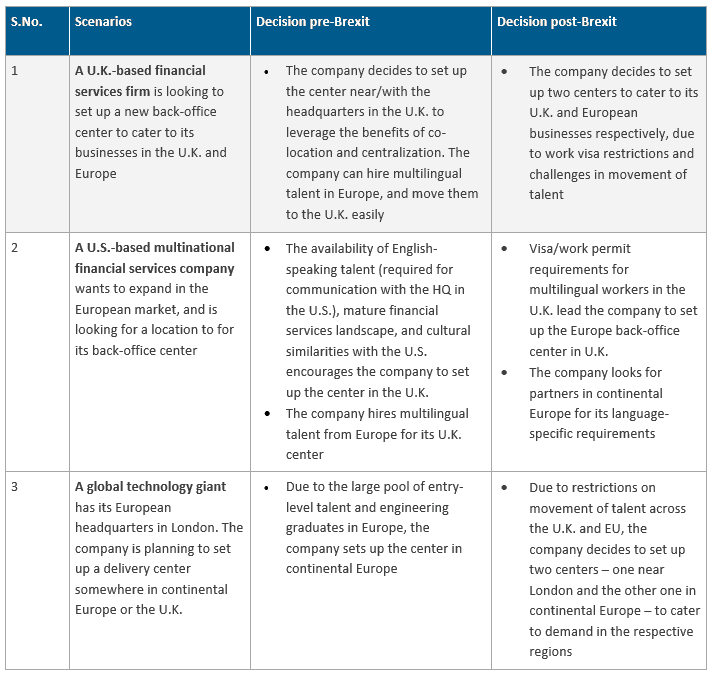How Will Brexit Impact Your Europe Delivery Strategy? | Sherpas in Blue Shirts
On June 23, 2016, the United Kingdom (U.K.) voted to leave the European Union (EU) through a referendum, also known as “Brexit.” Indications over the last few months are that it will be a “hard Brexit,” wherein the U.K. makes a clean break from the EU’s common market. If that happens, we can anticipate the following major changes to the global services operating environment:
- Passporting for companies will become tougher: Banks and financial institutions in the U.K. will find it more challenging to operate/set up new centers across countries in the region, as the U.K. will no longer be a part of the EU free trade market
- Talent movement across U.K. borders will be a challenge: People will require separate work visas to work in the U.K. and continental Europe. Although this is expected to apply to new work visas, changes to visas for people currently working in these countries are still uncertain.
As many global companies leverage the U.K. and countries in continental Europe to deliver services to all of Europe, passporting and talent movement restrictions could have a significant impact on their business strategy, regardless of their operating location in the region.
Potential Brexit impacts on companies operating in the U.K. and EU
In the wake of the uncertainty, global companies that are planning to service their European customer base would prefer setting up their GICs/back-office centers in continental Europe instead of the U.K. This might cause a surge in back-office activity in continental European locations, and talent demand for multiple IT and business process functions in those countries might go up.
Additionally, companies that are currently operating in the U.K. and the rest of Europe will need to prepare for possible legal/policy changes, and will need to expedite visa, HR, and administrative processes for their employees. We expect this to lead to increased demand for back-office activity in the U.K. and continental Europe.
Moreover, with talent movement restrictions becoming a possibility, companies currently operating only in the U.K. might need to rethink their talent hiring strategy in the region, especially for language-specific needs that were previously easy to fulfill.
To paint a picture of the potential Brexit impacts, following are several sample scenarios about companies operating in the U.K. and EU, and their possible decisions pre- and post-Brexit.
What lies ahead for those impacted by Brexit decisions
Until the exact Brexit-related policy changes become clearer, global companies might delay or shelve their investment decisions for the U.K. and rest of Europe. They might also possibly move toward greater levels of automation in their business operations to mitigate potential risks.
While it will be a wait and watch game over the next 10-12 months for companies operating in the U.K. and EU, they’ll need to keep their eyes carefully trained on developments in order to create effective strategies for dealing with the possible changes in the near- and long-term.
For a more detailed discussion on the topic, please refer to the recently released Everest Group viewpoint, “The Road Ahead: A Global Services Perspective on the Impact of Brexit. ”

